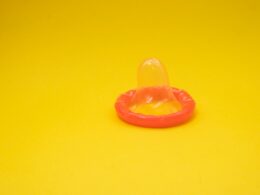While condoms are effective, they don’t have a 100% pregnancy-prevention rate. There is also a small chance that a woman could become pregnant if semen gets into her anus or vagina before the condom is put on properly.
It’s important to use condoms during all types of sexual activity. However, it’s best to avoid latex condoms and lubricants that contain benzocaine.
They are effective
When used correctly, male condoms are 98% effective at preventing pregnancy. But people aren’t perfect, and about 13 out of 100 women who use condoms as their sole method of birth control each year will get pregnant. Female condoms are only 79% effective. Condoms also work well to reduce the risk of sexually transmitted diseases (STIs). However, they won’t protect against herpes or genital warts.
Condoms can break if they come into contact with sharp objects like jewelry, piercings and teeth. They may also rip if they are stored poorly. Check the date on the package before using a condom, and don’t use one that is sticky or dry. You can buy condoms in pharmacies and at most sexual health clinics. In some areas, you can also get free condoms from GP practices, young people’s clinics and some community pharmacies. Oil-based lubricants, such as Vaseline, can make latex and polyisoprene condoms less effective. Water and silicon-based lubricants, which are available in most pharmacies, are safe for all types of condoms.
It’s important to remember that condoms are only one form of birth control, and they can be a great tool for couples who want to avoid pregnancy. They can also help lower the risk of STIs such as gonorrhea, chlamydia, syphilis, HIV/AIDS and hepatitis B. These infections can be dangerous for unborn babies, especially if the woman becomes infected with them.
They are safe
Using condoms during pregnancy can help prevent sexually transmitted diseases (STIs) that can harm you or your baby. STIs such as chlamydia and gonorrhoea can cause problems with the eyes and heart of the baby, and syphilis may lead to miscarriage or premature birth. You can protect yourself by always using protection, including during anal and oral sex. You can also get a free condom from family planning Australia, which also offers STI testing and emergency contraception.
Male condoms are about 98% effective with typical use, and female condoms are about 79% effective. If you use them correctly, they significantly decrease your chances of getting an STI, such as chlamydia, gonorrhea or HIV. They can also lower your risk of passing STIs to your partner, especially if you both wear them every time.
You can purchase condoms at pharmacies, GP practices and youth clinics. You can find a range of styles, sizes and colours, as well as lubricants for them. Lubrication is essential to help the condom stick to your sex organs and slip off easily when you want to stop. You can also find non-latex condoms, which are safer for you and your partner. You should always check the expiration date on your condoms, and if they feel sticky or dry, don’t use them. You can also buy a lubricant that doesn’t contain perfumes or dyes, which could be absorbed through the vagina and pass to your baby.
They are easy to use
Condoms are a cheap and easy method of birth control that protects against pregnancy, sexually transmitted diseases (STDs) and infections such as HIV/AIDS. They are available in many different forms, including latex and plastic. If you are allergic to latex, try synthetic rubber alternatives. Many brands also add lubricants and preservatives to make them easier to use. However, some of these additives can cause vaginal inflammation and yeast infections in pregnant women. Avoid water-based lubricants that contain sugar and sweeteners. You should also stay away from talcum powder, starch or other substances that decrease condom adhesion. These substances may increase the risk of STIs by increasing the alkalinity of the vaginal fluid.
A condom is a fine tube that is rolled on to the penis before sex and acts as a barrier to stop sperm from passing through. It can be used for oral, anal and vaginal sex. It can also be used to protect against STIs such as chlamydia, gonorrhea, herpes and syphilis. Using a condom with an external spermicide can also be helpful.
If you are concerned about pregnancy, talk to a health professional about alternative methods of birth control. You can take an over-the-counter emergency contraceptive pill (sometimes known as Plan B) or visit a clinic to get a copper intrauterine device. These options are effective up to 72 hours after unprotected sex.
They are affordable
Condoms are inexpensive, readily available, and highly effective at preventing pregnancy and sexually transmitted diseases (STDs). They’re easy to use, require no prescription, and are available in a variety of styles, colors, and textures. They also come pre-lubricated and can be used with most types of lubricant.
When used correctly, male condoms are 98% effective at preventing pregnancy. However, in real life, about two out of 100 people will get pregnant each year when using condoms as their only birth control. Female condoms are 85% effective at preventing pregnancy, and both can reduce your chance of contracting or transmitting STIs.
A condom’s effectiveness decreases if it comes in contact with anything other than semen. It can also break if it’s exposed to sunlight or heat, or if you use it with oil-based lubricant. It’s important to read the label, store them properly, and check their expiration date. Condoms can last between one and five years, depending on the material they’re made from.
If you’re worried about getting an STI, use emergency contraception or see your doctor immediately. STIs often don’t show any symptoms, so it’s important to be tested as soon as possible. You can also get free STI testing from sexual health clinics, pharmacies, and some GP practices. If you’re concerned about HIV, visit your local sexual health service or A&E for PEP (post-exposure prophylaxis). There are lots of safe and effective options for pregnancy prevention, so it’s best to use a combination of methods.





